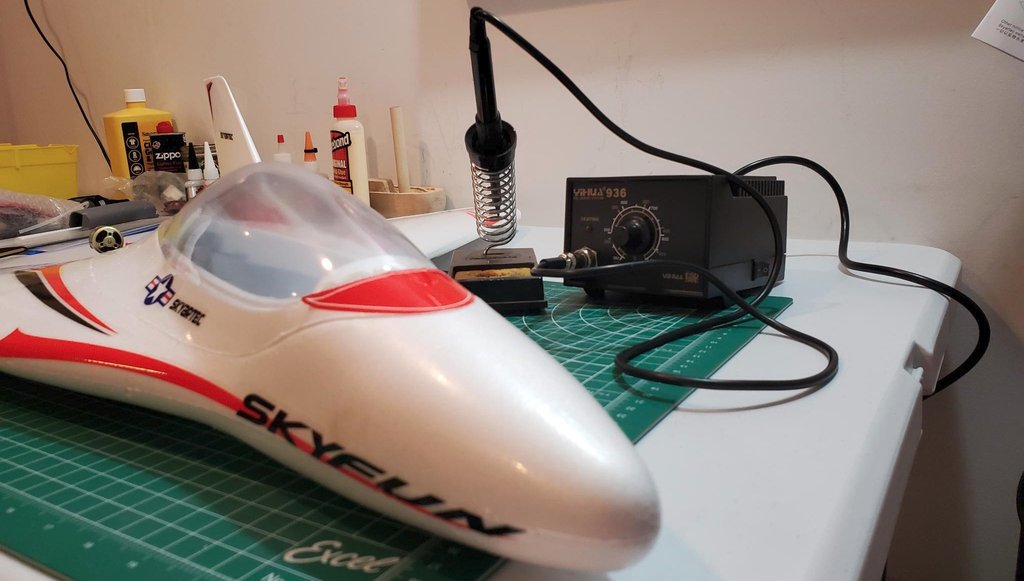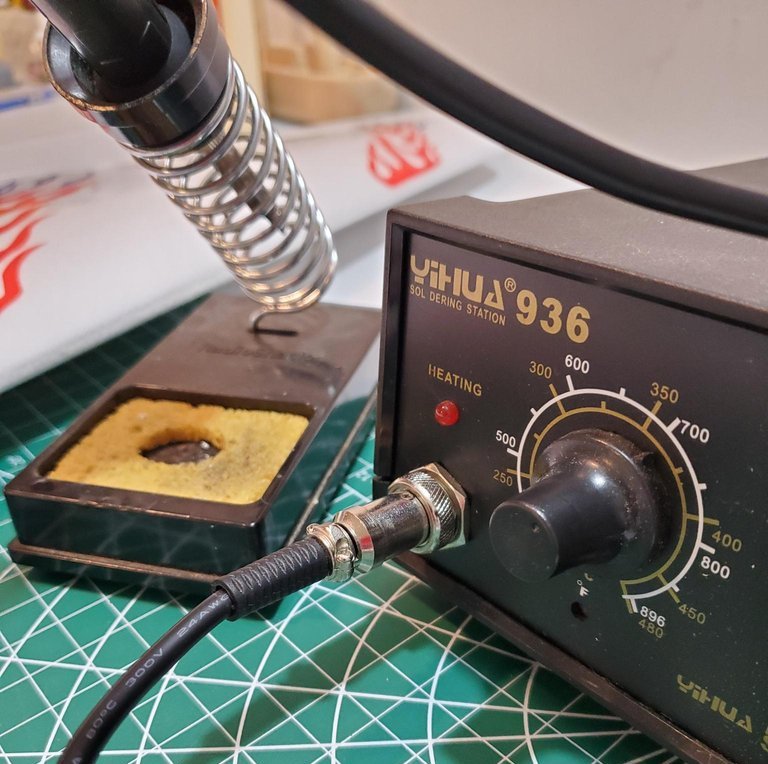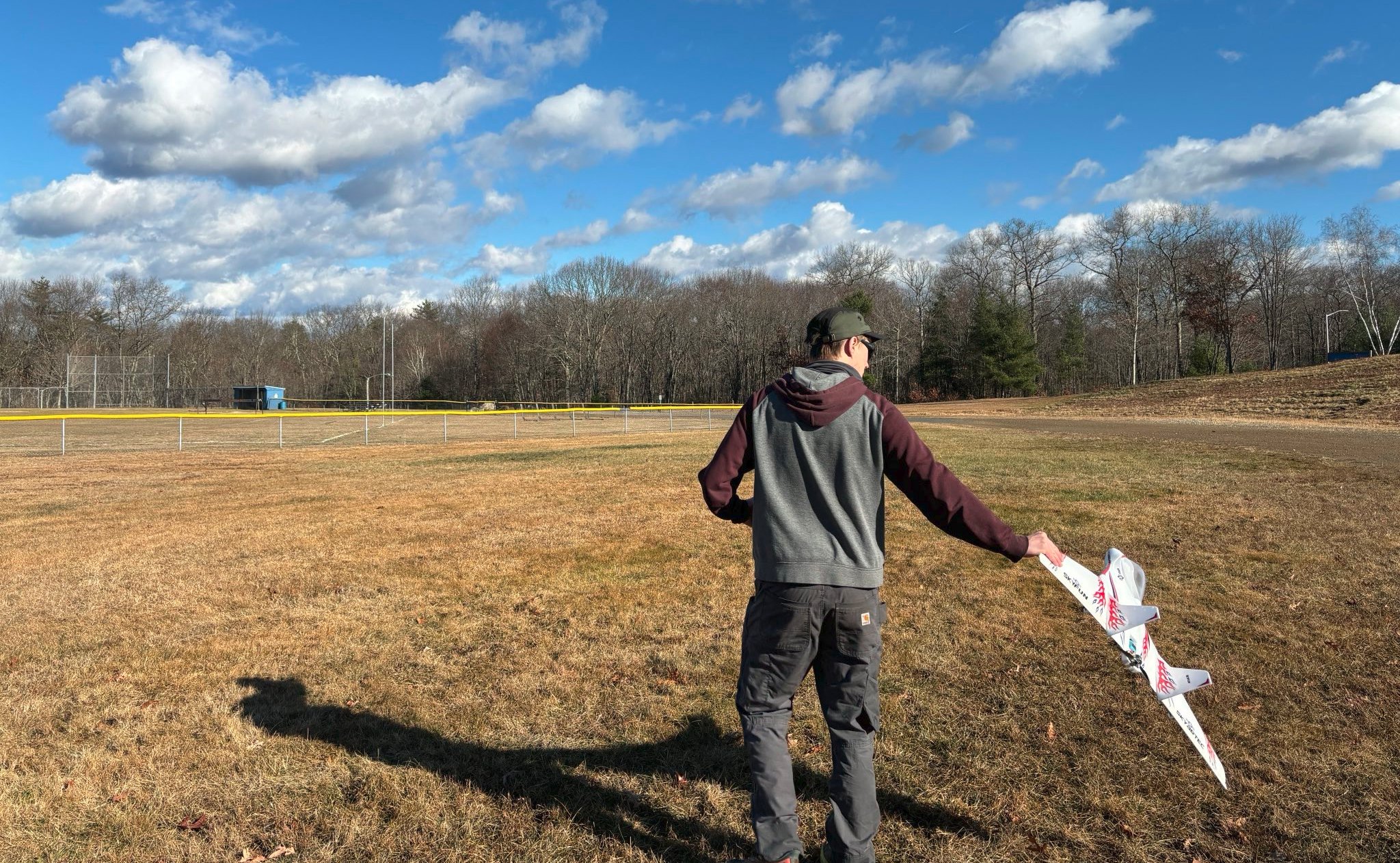With over 10 years in service without a glitch, my very first soldering station finally died the minute I finished the connector on this SkyFun jet – a re-purchase of my very first RC airplane. It was serendipitous and eerie.

Some internal electronic component on the circuit board finally died – so what? You may remember from my drone business post, that I had acquired a SkyFun jet for a science fair project back in 2011. The science project provided a proper ruse and excuse to order such a thing, which was ostensibly part of the allure and decision to do a project on drones. I imagine this was somewhat clear to my parents, but who knows. Convincing mom and dad to buy me an RC jet: difficult. Convincing them to buy me a table “prop” (which just happens to be an RC jet) for a school project’s nighttime event: not impossible, evidently.
A year or so after the science fair (and after crashing the SkyFun, which happened before the fair), I was soldering custom electronics to sell online. I invested in the business and bought myself a soldering station to upgrade from my cheap standalone RadioShack 30 watt iron, which dad bought me back when I was exclusively working on RC cars (thanks dad!), and which I mostly used in the garage before mom got less scared of the heat the tool produced and I was allowed to set up shop in the basement. The upgraded tool I ordered myself was from HobbyKing, a “YIHUA 936”, the first real soldering station I ever owned, with a variable temperature knob, stand and sponge – I felt like a pro!
Over the years, this soldering station directly provided me with income for all my RC endeavors – dozens of airplanes, a handful of helicopters, cars, multirotors, and even an underwater vehicle. This hobby kept me sane to some extent, as I fought off boredom; albeit, I became more interested in building and setting up something new on a regular basis, and this proved to be expensive and empty, ultimately, since I rarely kept anything for long enough to truly appreciate it. I liked buying and selling the most, but it set up an antipattern in my hobby: the more I bought and sold, the less I could actually fly, since most of what I had was in a state of building, configuring, or tear down for shipment.
Over time, I realized this. The hobby wasn’t even about the flying anymore, it was about the buying and set-up of the aircraft themselves. Whether this was ADHD, a shopping obsession, a function of the environment I was in, or something else, is up to you to ponder. Having many things happening simultaneously in the shop is what made the shop interesting and lively to me. The money didn’t exist to have enough planes all at once to have something actively being built while the rest sat – this is the paradox of being a modeler at a young age. The fleet can’t grow without selling a part of it… so the fleet doesn’t grow. It morphs from one thing to another. The collection of tools, however, stays. Like the soldering iron. Tinkering and building continues.
“The only constant in life is change.”
Having the soldering station die just moments after I used it on the SkyFun jet was eerie. The one from 13 years ago was long crashed and discarded. I had bought the jet this time for the nostalgia, and to finally fly the thing, since I never quite managed a flight more than 30 seconds with it years ago. I was such a newbie that I didn’t understand that “up” on the controls meant “down” in the air, and dad and I struggled to hand-launch the thing for ages. I can’t make this up, that the soldering station died immediately after performing the only modification I needed to do on the new SkyFun: installing the right battery connector. With this, it was born into the category of “ready to fly” aircraft in my shop.
The jet was my entry point into the world of RC aircraft; the soldering station was my entry point into a whole world of tinkering and modifying electronics. To have these two collide on the same day, one in birth and one in death, made me pause and reflect for a moment. I was soldering, just finished, and in fact when I went back to see if the joint was solid, I debated if I would need to re-do one of the wires because it might not be just as perfect as I wanted it to be. But upon further inspection, the connection was very solid, and after years of being unsure of my soldering and never having a joint fail, ever, I forced myself to stop overthinking it and let it be.
And at that moment the light went out on the front of the soldering station, and never came back on.

Math is not about numbers; literature is not about words; hobbies are not about objects.
I know from studying math that the numbers are secondary to the true art of the field. Chipping away at the truth through rules and rigor is a dimension above studying the numbers. I recently read Kafka’s Metamorphosis, and it shifted my view of what literature is – or, I suppose, made it much clearer what the point is. It’s easy to consider the words in a story at a much higher importance than the true value of its meaning. To jump from seeing the beauty in the word-patterns to interpreting meaning is to jump into a higher dimension.
An author can pick any subject and elucidate complex emotions and depth through telling a story about it (especially Kafka). The “gadgetry” with which they accomplish this – the words themselves – are secondary to this higher dimension of the story. The servos I chose for my DLG build are secondary to the deep world of composite building techniques and the mastery thereof which I made progress in striving for during the build process.
I started in the world of tinkering hobbies with some perception that the point was firstly about gadgetry and objects, yet I spent a massive amount of time on online forums reading and chatting with likeminded people, and this communication and camaraderie gave the hobby real zest and excitement. The hobby, even from the beginning, was not solely about the objects themselves. All the build logs, project posts, pictures and videos, how-to guides, debuggers and crashers just like me were there with me online in one place. They worked on their craft to improve their skills and knowledge, to develop themselves as modelers, and soak up the expertise of this and that niche builder and technique, in the slow pursuit of mastery and comfortability with the building and flying environments.
Math is about patterns, change, and finding truth; literature is about emotion, experience, and telling stories; hobbies are about craft, community, and development towards mastery. The precise objects which make up the atoms of these endeavors are pivotal, yet still secondary to the true narrative and weight in the world of the human pursuit of the endeavor itself.
Good night, YIHUA 936!

 Launching my second SkyFun was easy; trimming it on the first flight in the breeze was a bit tricky though.
Launching my second SkyFun was easy; trimming it on the first flight in the breeze was a bit tricky though.
Best,
Daniel
P.S. Mom is buying me a new soldering station for Christmas. Thanks mom!